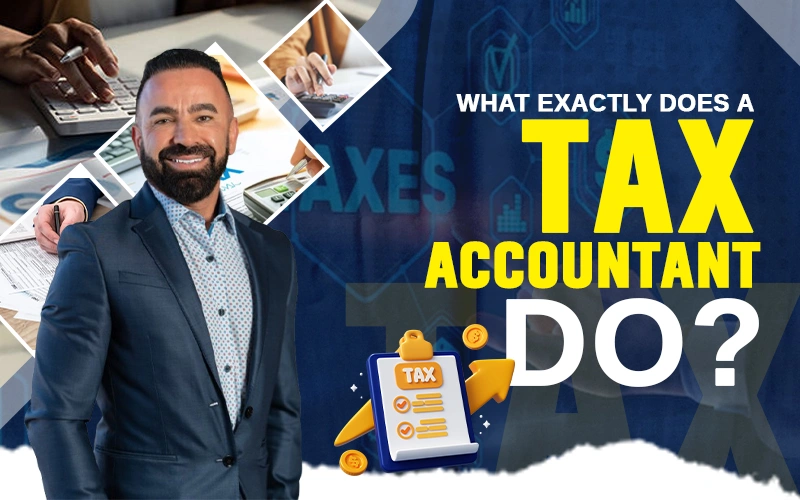
Regardless of whether you are a businessperson, a freelancer, or an employee, it is essential to know your tax obligations in order to stay financially healthy and legally sound. Tax law is, however, complicated, and a mere mistake can cost you fines or forfeited savings. This is where a tax accountant comes in. Tax accountants are professionals who have knowledge of understanding tax law and putting it into practice for businesses and individuals in a way that they can fulfill their tax obligations efficiently and precisely.
In this blog, we are going to explore in greater detail what a tax accountant does, what services they can provide, the skills they can provide, and how to know if you should or not hire one.
Getting the position of a Tax Accountant
A tax accountant is a financial expert who prepares, examines, and files tax returns. General accountants address all kinds of financial issues, whereas tax accountants address particularly issues related to local, state, federal, and even foreign tax laws.
Their main job is to make their clients conform to all tax regulations and reduce their tax bill through proper deductions, credits, and planning.
Key Duties of a Tax Accountant
1. Filing Tax Returns
The most common work a tax accountant performs is preparing and filing tax returns for individuals, corporations, charities, and other organizations. These accountants compile financial information, make qualified deductions or credits, and file relevant documents with taxing authorities.
2. Tax Planning
A proactive tax accountant doesn’t simply focus on what they’re owed by you—they assist you with planning your future. Tax planning is setting your position in the present financially and determining how to reduce tax liability in the future. This might involve retirement planning, investment planning, and business structuring.
3. Tax Law Changes Advice
Tax codes evolve daily. From the modification of deductions to corporate tax rates, staying current can be a full-time job. A tax accountant stays current on the newest legislation and regulations so that their clients are always in compliance.
4. Client Work During Audit
If the client is being audited by the IRS or any other tax authority, a tax accountant can act as an agent. They can represent the client during explanation of filings, responding to requests for further information, and resolving conflicts.
5. Record-Keeping and Bookkeeping
While not every tax accountant offers bookkeeping, many help clients keep their books up to date during the year. This means when tax season arrives, all the information is available and accurate.
Services Offered by Tax Accountants
The services which a tax accountant can provide may vary according to the client’s needs, but generally include:
Individual Tax Services: Filing individual income tax returns, planning charitable contributions, calculating taxes on investments, etc.
Business Tax Services: Preparation of payroll taxes, sales tax returns, quarterly tax estimates, and corporation tax returns.
Global Tax Guidance: Expat tax management, foreign investment, and cross-border business operations.
Estate and Trust Taxation: Planning and preparation of estate, inheritance, and trust taxes.
IRS Representation: Representation and defense of clients in audits or tax litigation.
All these services fall under the umbrella of tax accounting services, geared towards short-term compliance and long-term financial success.
Choose the Right CPA Firm for Your Business
Partner with Jarrar & Associates for expert tax, accounting, and financial guidance tailored to your needs—so you can focus on growth.
Qualifications and Skills of a Tax Accountant
Not all tax practitioners have such qualification. Some of the qualifications and skills commonly found in good tax accountants are as follows:
1. Education and Certification
Most tax accountants have a bachelor’s degree in accounting, finance, or a related major. Most continue on to earn additional credentials such as:
Certified Public Accountant (CPA): A certified CPA has completed a demanding exam and fulfilled some education and experience requirements.
Enrolled Agent (EA): This classification provided by the IRS allows individuals to represent taxpayers in any function before the IRS.
Master of Taxation (MTax): A postgraduate degree with an exclusive focus on higher tax issues.
2. Analytical Skills
Tax accountants need to have the capacity to understand complex tax codes and apply them to real-life client situations. Analytical minds are needed to identify opportunities and avoid pitfalls.
3. Attention to Detail
Even minor mistakes in a tax return can result in dire consequences. Tax accountants are accurate and meticulous in their calculations.
4. Communication Skills
Tax clients typically rely on tax accountants to make complicated tax matters easy to understand. Good communication skills are important, especially during audits or financial inspections.
When to Hire a Tax Accountant
Simple tax returns are something most individuals can manage with do-it-yourself software program kits. There are times, however, when it’s not only smart—it’s necessary
1. You Own a Business
Small business owners and entrepreneurs have complex tax scenarios that are enriched by professional expertise, such as employee tax withholdings, depreciation, and quarterly estimated taxes.
2. You’ve Had a Major Life Change
Marriage, divorce, childbirth, inheritance, or purchasing property can all significantly impact your tax situation.
3. You Have Multiple Sources of Income
If you earn money in multiple ways—such as freelancing, investments, or property—having a tax accountant navigate the intricacies for you can be helpful.
4. You’re Undergoing an Audit
If you’ve been informed that you’ve been audited, a tax accountant can guide you through it and take some of the stress of responding to the IRS.
Choosing the Appropriate Tax Accountant When selecting a tax accountant, consider the following:
Industry Experience: Different industries have different tax concerns. A tech startup founder, for example, will have a different requirement than a real estate investor.
Reputation and Reviews: Look for references, testimonials, or reviews online.
Pricing Structure: Understand how they charge—flat fee or hourly—and what is covered in the service.
Credentials: Confirm that they have the necessary licenses, such as CPA or EA, and are in good standing.
While in California, it ensures local tax nuances are incorporated into federal regulations by having a Los Angeles accountant as a tax expert.
Final Thoughts:
Your tax accountant is not just a calculator: he or she is a strategic planner, a compliance expert, and in most cases, a financial confidant. From handling complex business taxes to simply desiring to optimize your current return, a seasoned tax accountant can save you money, time, and stress. As complex tax regulations increase, the necessity for professional tax accounting services is even more required. With the help of a reliable expert, you can be certain that your taxes are under good care—and that you’re taking advantage of every fiscal opportunity out there.
Also Read: Tax vs Audit Accounting – Understanding the Difference



